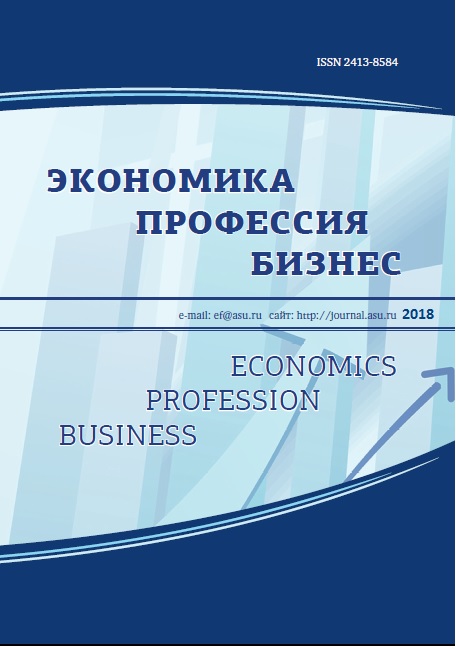MARKETING OF TERRITORIES AND ECONOMIC DEVELOPMENT OF CITY SETTLEMENTS (THE CASE OF SOLVYCHEGODSK, ARKHANGELSK OBLAST)
Abstract
The article is devoted to solving the problems of the economic development of urban settlements on the basis of the application of principal provisions, methods and means of marketing the territories. With reference to the works of well-known scientists, theory of economic growth and the theory of economic development are considered in detail as independent but interrelated. The causes and effects of economic development and economic growth, their influence on each other, the role of innovation and entrepreneurship in ensuring economic development and economic growth of enterprises, regions, countries are described. The article states that the methodological and methodological basis for ensuring economic development and growth of urban settlements is the marketing of territories aimed at the search for and identification of unique characteristics of the terrain and their use in attracting attention and financial resources interested in their consumption of the parties to this territory. Thus, the marketing of territories is proposed to be used as a real methodological means of including in the operation of such a factor of production as entrepreneurial activity. The article also presents a marketing analysis of the unique characteristics of the city of Solvychegodsk in the Arkhangelsk oblast and offers to use them in the strategic plan for the economic development of this city.Downloads
Metrics
References
Шумпетер Й. А. Теория экономического развития. Капитализм, социализм и демократия. М., 2007. 864 с.
Маркетинг территорий: методология и методы обоснования стратегических решений развития регионов / В. И. Беляев, С. Н. Бочаров, О. А. Горянинская, Р. Г. Малахов. Барнаул, 2015. 244 с.
Беляев В. И., Дмух И. С., Золотова М. Н., Золотова О. Н. Маркетинг территорий: уникальные характеристики мест и их использование в стратегическом управлении административно-территориальными образованиями // Вестник Алтайского гос. ун-та. 2014. № 2/2. С. 285–291.
Беляев В. И., Беляев В. В., Безгодова О. И., Чернышева Е. В., Кошелева Н. А., Новикова М. Г., Шумилова А. Ю. Маркетинг территорий на локальных рынках предприятий местной промышленности и стратегическое управление региональным воспроизводством (на материалах ЗАО «Молочная сказка») // Вестник Алтайского гос. аграрного ун-та. 2014. № 2 (112). С. 160–171.
Беляев В. И., Кошелева Н. А., Шубина Е. А., Руш К. А., Долматова А. М. Маркетинг территорий: теория локализации бизнеса и методология проведения регулярных маркетинговых исследований предприятий местной промышленности (по материалам ЗАО «Молочная сказка») // Вестник Алтайского гос. аграрного ун-та. 2015. № 4 (126). С. 169–174.
Овсянников О. В. Сольвычегодск. Архангельск, 1973. 97 с.
Официальный сайт санатория «Сольвычегодск» [Электронный ресурс]. URL: http://kurortsol.ru/home.html
Минцберг Г., Альстрэнд Б., Лэмпел Дж. Школа стратегий. СПб., 2000. 336 с.
Русс Й., Пайк С., Фернстрём Л. Интеллектуальный капитал: практика управления. СПб., 2008. 436 с.
REFERENCES
Schumpeter, J. A. (2007). The theory of economic development. Capitalism, socialism and democracy. Moscow (in Russian).
Belyaev, V. I., Bocharov, S. N., Goryaninskaya, O. A., Malakhov, R. G. (2015). Territorial Marketing: Methodology and Methods of Substantiating the Strategic Decisions of Regional Development. Barnaul (in Russian).
Belyaev, V. I., Dmuk, h I. S., Zolotova, M. N., Zolotova, O. N. (2014) Territorial marketing: unique characteristics of places and heir use in the strategic management of administrative-territorial entities. Bulletin of the Altai State University, 2 (2), 285–291 (in Russian).
Belyaev, V. I., Belyaev, V. V., Bezgodova, O. I., Chernysheva, E. V., Kosheleva, N. A., Novikova, M. G., Shumilova, A. Yu. (2014). Marketing of territories on local markets of local industry enterprises and strategic management of regional reproduction (on materials of CJSC “Molochnaya skazka”). Vestnik of Altai State Agrarian University, 2 (112), 160–171 (in Russian).
Belyaev, V. I., Kosheleva, N. A., Shubina, E. A., Rush, K. A., Dolmatova, A. M. (2015). Territorial marketing: the theory of business localization and the methodology for conducting regular marketing research of local industry enterprises (on materials of CJSC “Molochnaya skazka”). Vestnik of the Altai State Agrarian University, 4 (126), 169–174 (in Russian).
Ovsyannikov, O. V. (1973). Solvychegodsk. Arkhangelsk (in Russian).
Official site of the sanatorium “Solvychegodsk”. Available from: http://kurortsol.ru/home.html/ Accessed on 10.01.2018.
Mintsberg, G., Alstrend, B., Lampel, J. (2000). School of Strategies. St. Petersburg (in Russian).
Russ, J., Pike, S., Fernström, L. (2008). Intellectual Capital: Management Practice. St. Petersburg (in Russian).
Copyright (c) 2018 Economics Profession Business

This work is licensed under a Creative Commons Attribution 4.0 International License.
Economics Profession Business is a golden publisher, as we allow self-archiving, but most importantly we are fully transparent about your rights.
Authors may present and discuss their findings ahead of publication: at biological or scientific conferences, on preprint servers, in public databases, and in blogs, wikis, tweets, and other informal communication channels.
Economics Profession Business (EPB) allows authors to deposit manuscripts (currently under review or those for intended submission to EPB) in non-commercial, pre-print servers such as ArXiv.
Authors who publish with this journal agree to the following terms:
- Authors retain copyright and grant the journal right of first publication with the work simultaneously licensed under a Creative Commons Attribution License that allows others to share the work with an acknowledgement of the work's authorship and initial publication in this journal.
- Authors are able to enter into separate, additional contractual arrangements for the non-exclusive distribution of the journal's published version of the work (e.g., post it to an institutional repository or publish it in a book), with an acknowledgement of its initial publication in this journal.
- Authors are permitted and encouraged to post their work online (e.g., in institutional repositories or on their website) prior to and during the submission process, as it can lead to productive exchanges, as well as earlier and greater citation of published work (See The Effect of Open Access).









